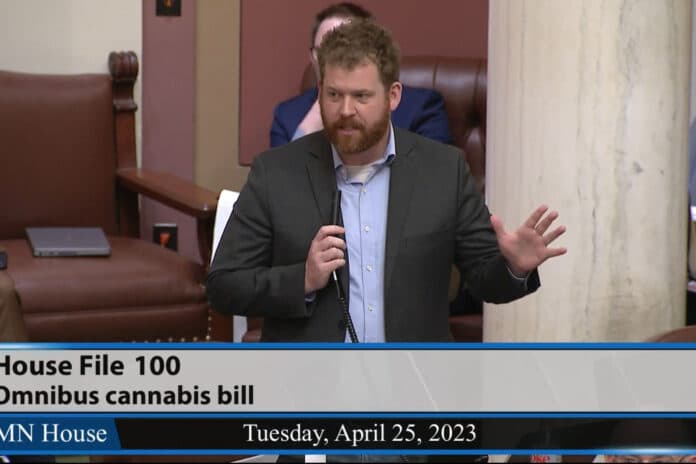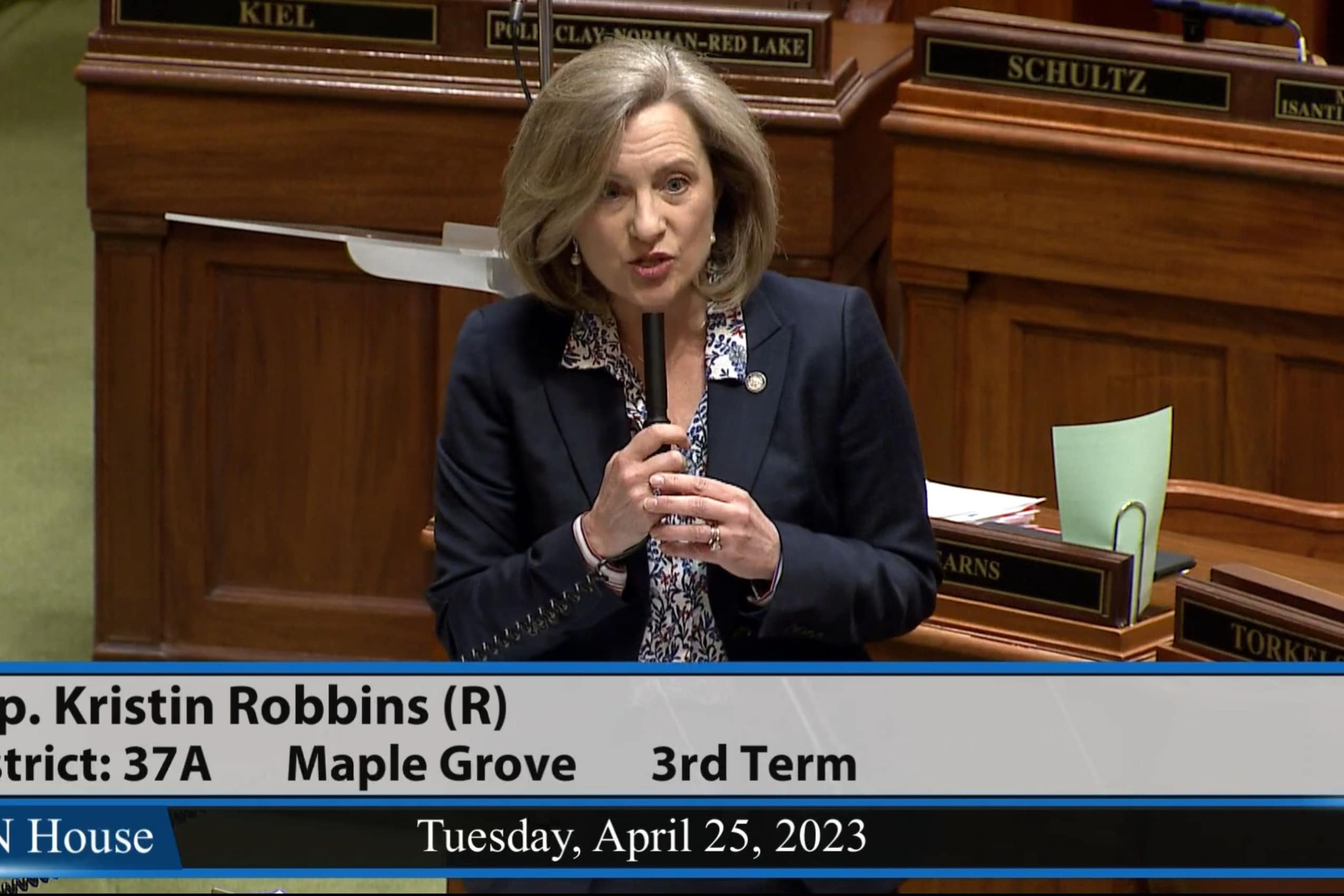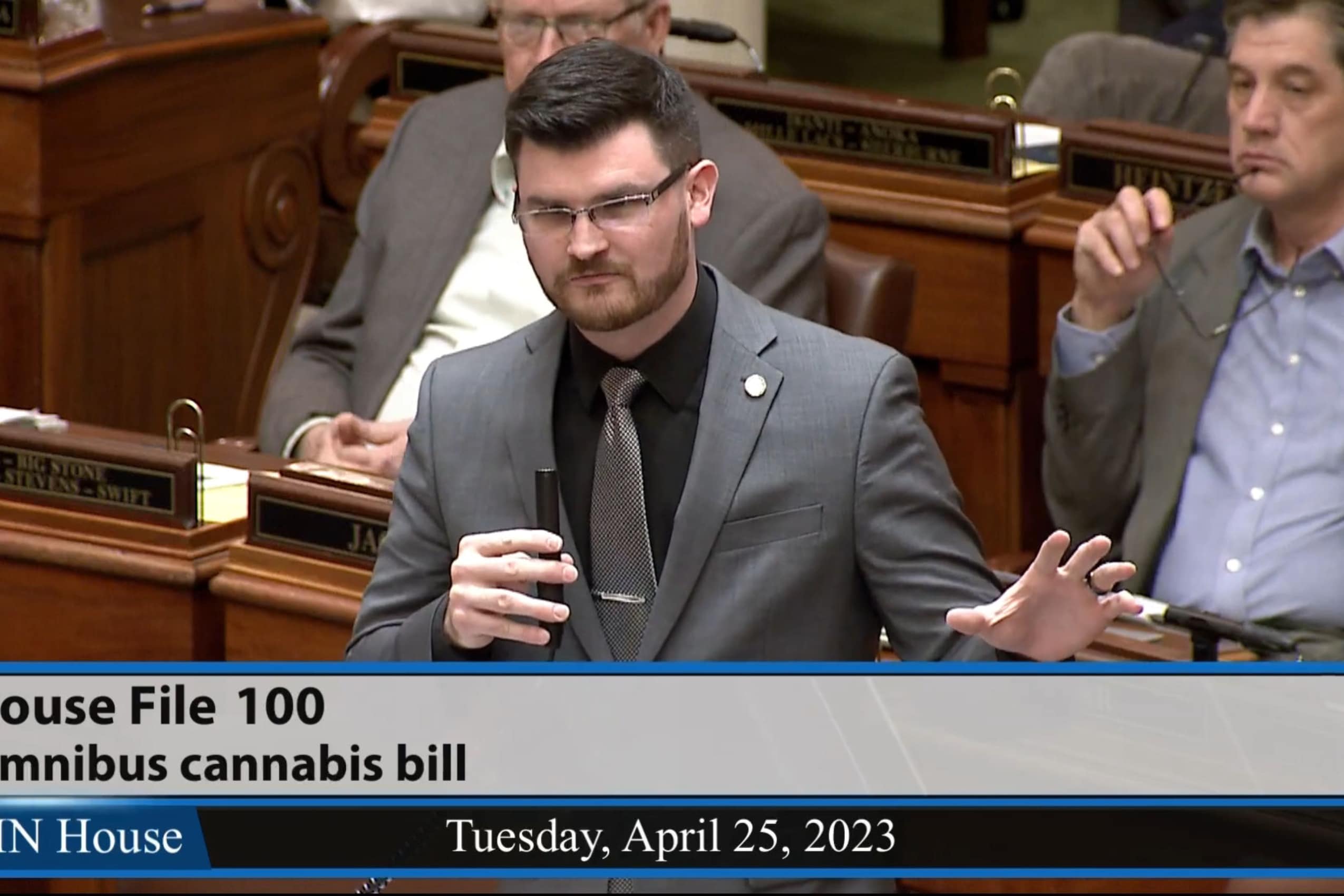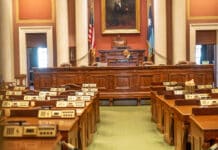
DFL party leaders and legislative candidates campaigned during the 2022 election cycle on the slogan “Minnesota is Ready” to legalize recreational marijuana. Former DFL House majority leader Ryan Winkler even adopted that slogan as the name of the legislative advocacy group he helped form to lobby the House and Senate this session to pass a recreational cannabis bill proponents say has been a long time coming.
On Tuesday, pro-legalization advocates came one step closer to achieving that goal as the House of Representatives passed HF100 on a mostly DFL-backed 71-59 vote.
One DFLer, Gene Pelowski of Winona, voted against the bill. Two Republicans, Shane Hudella of Hastings, and Nolan West of Blaine, voted for the bill.
The DFL-controlled House passed legalization last year, but the bill was stalled in the GOP-controlled Senate.
Provisions in the bill would make it legal for individuals age 21 or older to:
- possess up to 2 ounces of cannabis in a public place and 1.5 pounds in their home;
- possess or transport edible products infused with up to 800 mg of THC;
- possess or transport up to 8 grams of adult-use cannabis concentrate;
- give away cannabis and cannabinoid-related products in an amount that is legal for individuals to possess in public;
- cultivate up to eight cannabis plants on their residential property.
Another provision in the bill would also expunge the criminal records of those convicted of low-level cannabis offenses.
“Arresting people, locking them up for consuming cannabis does not make our state safer,” said Rep. Zack Stephenson, DFL-Coon Rapids, who authored the bill and testified on its behalf in more than 16 committee hearings this legislative session.
“We’ve done the work here,” Stephenson said in his closing remarks before the House vote on the bill. “Minnesotans want this. I heard it this fall, and I am sure you did too. It’s not just that the majority [of Minnesotans] support it. It’s a trend line. Look at where it’s headed. We can do this today. Minnesotans are ready.”
Senate will take up cannabis bill on Friday
The Senate plans to take up the bill this Friday. Its version of the bill, SF73, faces a steeper climb for approval, as DFLers outnumber Republicans in that chamber 34-33. But bill authors and proponents have expressed confidence in their “trifecta” and believe the bill will get to the desk of Gov. Tim Walz this session. Walz has repeatedly vowed to sign the legislation into law, despite a number of criticisms over many of its provisions coming from stakeholders in the business community, public safety organizations and substance abuse advocates.
House Republicans in opposition to the bill criticized their DFL counterparts’ rejection of local control-related amendments they have offered during committee meetings and on the House floor Monday night. They want more authority for cities and counties to regulate where marijuana dispensaries and related businesses can be located and how many can be allowed in a jurisdiction. They also criticized the Aug. 1, 2023 enactment date for many of the bill’s decriminalization provisions.
Legalization this summer gives black market sellers a head start, Republicans say
Rep. Kristin Robbins, R-Maple Grove, is one of 58 House Republicans to cast a vote against the bill. She told her House colleagues she remains hopeful those who favor legalization will come to their senses and extend out the Aug. 1, 2023 enactment date, which she believes would help stave off black market opportunists from getting a head start on a newly created and regulated cannabis industry.

“Members, [elimination of the black market] won’t happen,” Robbins said. “And partly, it won’t happen because we’ve seen it hasn’t happened in other states. And it won’t eliminate the black market because of the design of this bill.”
“As of Aug. 1 of this summer, you can grow it at home. You can give away two ounces. Everything will be legal. But the regulatory framework that [bill proponents] continue to say is the selling point for safety and testing and how everything will be packaged and labeled — that’s not going to be available for another year if we are being optimistic. And I think that’s crazy optimistic. I think it will be at least a year and half. So the black market is going to have a year and a half head start on this.”
Debate over youth impact of legalization
While supporters and opponents debated the public health and safety issues related to recreational marijuana consumption and age restrictions, Rep. Nolan West, R-Blaine, who voted for the bill, told colleagues that young people are already consuming cannabis and continuing to criminalize it won’t change that fact.
“We are not stopping anybody from [using marijuana] right now,” West said. “We are just encouraging a kid to have a bad interaction with a police officer when they are caught with dope in their backseat.”

West’s comments on Tuesday came following an amendment offered the prior evening by his fellow Republicans that would push the age restriction of recreational cannabis consumption to 25 years old. Several testifiers on the bill have pointed to studies that show marijuana consumption has negative impacts on the still-developing brains of young adults.
Rep. Dave Baker, R-Willmar, who offered the age 25 and up restriction amendment, said the measure has support from addiction treatment centers such as Hazelden and Project Turnabout and from health care professionals who belong to the non-profit Smart Approaches to Marijuana.
“That four years — from 21 to 25 — will make all the difference in the world,” Baker said.
The age 25 amendment failed 70-57. Four Republicans who voted against it included: West, Pat Garofalo of Farmington, Patricia Mueller of Austin, and Elliot Engen of White Bear Township. One DFLer, Carlie Kotyza-Witthuhn of Eden Prairie, voted for the amendment.
The House passage follows the legislature’s 2014 passage of medical marijuana, signed by then-Gov. Mark Dayton. In the 2022 session, the legislature passed a recreational cannabis edibles bill signed into law by Gov. Walz.
Hank Long
Hank Long is a journalism and communications professional whose writing career includes coverage of the Minnesota legislature, city and county governments and the commercial real estate industry. Hank received his undergraduate degree at the University of Minnesota, where he studied journalism, and his law degree at the University of St. Thomas. The Minnesota native lives in the Twin Cities with his wife and four children. His dream is to be around when the Vikings win the Super Bowl.















